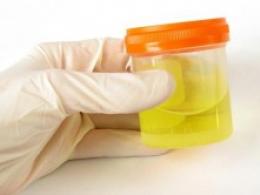At what age does the baby stop spitting up. Until what age does a baby spit up after feeding or when children stop spitting up, as well as the causes and prevention of spitting up. Spitting up a fountain - what is the danger
Oh, those young parents! As soon as a small child is born, moms and dads have a lot of questions. And of course, after several times a part of the milk sucked by a child ends up on the clothes of an adult, a natural question arises about when the children stop spitting up.
What is considered regurgitation?
Sometimes there is an ejection of part of the food back from the stomach into the esophagus, and then into the oral cavity and out. This is what burping is. This usually happens with babies.
Usually regurgitation in newborns occurs immediately after the baby has sucked milk. But it may take some time, then curdled milk comes out.
This happens in perfectly healthy babies, but can signal a disease. The main thing is that the volume of rejected milk does not exceed 3 ml and this does not happen too often.
Most likely, the baby will spit up in the first months after birth. Until the baby’s body recovers after birth and the stomach begins to cope with food, this is inevitable. But usually by the time the baby sits steadily on its own, the problem goes away by itself. In any case, all healthy babies no longer spit up when they take their first step. But be prepared for new manifestations during teething or indisposition of the baby.

The great science of statistics has revealed that regurgitation in babies under 4 months old occurs in almost everyone. But if this phenomenon is repeated too often and in large volumes, this is a reason to visit a doctor.
Therefore, if the baby spews more than 3 ml of stomach contents through the mouth after each feeding, or this happens constantly, it is necessary to undergo an examination and find out the cause. At what age does a child stop spitting up and is it harmful? Let's look at it later in the article.
Frequent spitting up can lead to inflammation in the esophagus and other serious consequences in the digestive tract.
Why is this happening?
- If the baby is premature or had a delay diagnosis, then regurgitation will be a frequent companion for such children.
- This happens due to the later maturation of the processes responsible for sucking and swallowing, as well as with an imperfect gastrointestinal tract.
- Usually, after 8 weeks, the body returns to normal, catches up with its peers who were born on time, and the question of when the child stops spitting up gradually ceases to be relevant.
- The next reason for the rejection of milk is banal overfeeding. This can be either too frequent feeding or large volumes of offered milk.
- Also a very common cause of regurgitation is a mixed diet. Often mothers think that the baby does not have enough milk, and begin to supplement it with formula. Because of this, the child's stomach is too full, and he rejects the excess.
- In addition, if the child is completely crumbs, then mixing different foods, breast milk and formula also leads to disturbances and regurgitation.
- The classic cause of this problem is improper attachment to the breast. The child captures only the nipple, and air is swallowed, which then comes out with part of the drunk milk.

But fortunately, these phenomena pass. The question of when children stop spitting up is likely to disappear by the time the baby sits on its own.
When something's wrong
If the child is cheerful and cheerful, actively gaining weight and height, then there is nothing to worry about. But all parents should know when children stop spitting up and how long it can normally last. Therefore, if this phenomenon is too active, the baby is restless and weakly gaining weight, you should consult a doctor. Perhaps the child will be helped by medication, or perhaps surgery will be required. The issue of examination is decided purely individually. X-ray is one of the examination tools.
Prevention of regurgitation
A common question that new mothers ask each other is: "When did your baby stop spitting up?" Here, of course, everything is individual, but normally by the year this phenomenon should go away forever.
But so that regurgitation does not turn into a problem, a number of rules must be observed:
- Don't overfeed your baby.
- Ensure proper nipple latching. The areola should be completely in the baby's mouth. If bottle feeding, keep an eye on the nipple. It must be filled with milk completely, which prevents air from being swallowed.
- Position the baby not strictly horizontally, but slightly raising it.
- Give your child time to take a break. This is especially true for bottle sucking. If the baby himself knows what to do with the breast, then the milk from the bottle can flow continuously, which will create a reason for the rapid filling of the stomach and, accordingly, regurgitation.
- It is better to choose a feeding regimen more frequent, in smaller portions.
- advice for all time. Hold your baby upright after feeding. So excess air will come out, and the milk will remain in place. In addition, this action is an excellent prevention of colic.
- Place your baby on your tummy more often.
- Leave the baby alone after feeding.

Following these rules, you will soon forget about the question of when the child stops spitting up. And even if a few drops of milk come out, then nothing terrible will happen.
Summing up
Undoubtedly, every mother seems to feel the mood of her baby with her skin. Likewise with spitting up. If parents see that the baby feels great, does not show signs of anxiety or hunger, is gaining weight and generally developing within the normal range, then there is nothing to worry about.

But it happens that mom suspects that something is wrong. In this case, you should go to the doctor and show the child. If everything is normal, you will calm down and be able to ask the pediatrician about when the children stop spitting up. If your fears are confirmed, then the timely prescribed treatment will help solve the problem.
Almost every newborn baby can spit up from time to time. This scares many mothers, but there is no reason to worry. This process in most cases is absolutely natural, because the baby's body learns to digest new food for it - mother's milk or an adapted mixture. Regurgitation differs from vomiting by the amount of food excreted. It is impossible to say exactly until what age babies spit up, since the process of adaptation takes place in babies in different ways.
Reasons for regurgitation
As already noted, the main reason is the immaturity of the gastrointestinal tract. When it matures, the child stops spitting up. This happens closer to the third month of life. In this case, there should not be any other signs and symptoms of an unhealthy condition.
The second reason is hyperexcitability. Such children are characterized by restless behavior, increased muscle activity. Sometimes pediatricians decide on the need to take sedatives. With age, babies outgrow this condition. Sometimes the parents themselves are to blame for regurgitation. Firstly, the mother may incorrectly attach the baby to the breast, which causes air to be swallowed. Secondly, after feeding, the child should not be involved in active games, which is often a sin for dads. Thirdly, overfeeding. Of course, breastfeeding is the best sedative for babies, but this should only be done when the baby is hungry.

In rare cases, it does not matter how often and up to what age the child spits up. If the vomit contains an admixture of greenish bile, then you should consult a doctor without delay!
RecommendationsMany mothers are interested in when the child stops spitting up. Almost all parents face this phenomenon. However, they often worry about this. In fact, there is no reason to worry.
The child's body is constantly learning to process new foods. Therefore, this process is considered absolutely normal in most cases. However, it is impossible to determine exactly how many months the child burps. After all, each crumbs process of adaptation takes place in different ways. We can only guess the approximate time.
When food particles are thrown from the stomach into the esophagus after eating, and then go into the mouth and out, this is called regurgitation. Most often it occurs after the child has just eaten. Sometimes this happens after a while, and then already curdled milk is observed. This is quite natural, although in some cases it indicates the presence of any health problems.
It is necessary to carefully monitor regurgitation, its volume should not be more than 3 ml. Also, the process should not be repeated frequently.
To understand whether everything is going well, it is important to know until what age the child burps. Children usually do this in the first months of life, that is, all the time while the baby's body is recovering and getting used to unfamiliar food. Most often, children stop spitting up by the age when they already know how to sit confidently. And just like all healthy babies stop doing this when they already start walking. New manifestations of this process can be observed only when you feel unwell or when teeth begin to cut.
Reasons for regurgitation
In order to respond more calmly to this phenomenon, it is important to understand why this is happening at all. There are several reasons why a baby may vomit. Among them:
- The gastrointestinal tract is not yet mature. After the baby is born, his digestive system is gradually formed. This takes some time. The stomach is just beginning to get used to digesting unfamiliar food. Therefore, regurgitation stops only when the digestive tract is finally formed. Most often this is the third month of life.
- Binge eating. Babies often just eat too much milk or formula. This is because many babies simply do not feel the approaching saturation. All excess food is naturally excreted from the stomach.
- When feeding. If you feed him in an uncomfortable or wrong position for him, he will gasp for air along with food. The result is a feeling of discomfort. After that, the air begins to leave the stomach along with all its contents. This can be avoided if the mother carefully studies how to properly attach the baby to the breast, in what position to hold it, and so on.
- Mom eating the wrong foods. The food she eats is of great importance for the child. Certain foods can make him feel colic and bloated. In order to avoid this, the mother must adhere to a certain diet while breastfeeding. You can afford more free food when complementary foods begin to be introduced to the child.
- When switching from breastfeeding to artificial, regurgitation may occur. Or when one type of formula is replaced with another.
- The baby is restless after feeding. Too active actions of the child after he has eaten can provoke regurgitation. When the meal is finished, the child is recommended to be kept upright for some time. This will release all the air that he could gain while feeding. In addition, if the child burps in this position, it will not cause breathing problems.
For these reasons, most often children spit up. It is best if the mother tries to minimize this phenomenon.
To do this, you should monitor your own diet, properly hold the baby during and after feeding.
When to see a doctor
At the beginning of life, in its first stages, regurgitation of food masses occurs in children, and this is quite normal. It is only important to ensure that there are few of them and this is rarely repeated. However, there are times when regurgitation is a direct signal from the body that something is wrong. Then you need to visit a doctor. Pay attention to the following:
- The baby's appetite is normal, but at the same time he often burps, there is no weight gain.
- According to the behavior of the child, it is noticeable that after eating he has pain, he is uncomfortable. When he experiences discomfort in the stomach, he begins to scream and bend.
- Large volumes of regurgitation (more than 2 spoons). Then the food from the stomach returns in the form of fountain sprays. It happens that there is mucus in the mass, it has a green tint and an unpleasant odor.
- When the child is already a year old, but he does not stop spitting up.
- There are signs of dehydration.
Any behavior that is characterized by anxiety and is not characteristic of the baby while eating should alert parents. It is better to consult a doctor who will help establish the process of normal feeding and assimilation of food.
Of course, all mothers are waiting for the child to stop spitting up. But every woman can minimize this phenomenon if she adheres to a number of useful recommendations:
- Feed your baby only when he is hungry. At the same time, during the process, you should not overfeed it. It has already been noted that babies do not feel the impending saturation, so they often overeat. Mom should make sure that the child does not eat more than the norm.
- The child needs it right. He should have the entire areola in his mouth, completely. If you are not breastfeeding your baby, but from a bottle, then you need to watch how he grabs the nipple. It should be completely filled with milk. This will keep air out.
- When feeding, you do not need to place the crumbs in a clearly horizontal position. Hold it up slightly.
- Take breaks. This is especially true when you are bottle feeding, when the milk flows without interruption. The baby's stomach will quickly fill up, after which the baby will spit up. This cannot be allowed. Therefore, you should stop feeding for a while, taking breaks.
- Feed your baby more often, but in smaller portions.
- After the feeding process is completed, it is recommended to keep the baby upright, that is, in a column. This will allow excess air to escape, while the milk will remain in the stomach. This position is also the prevention of colic.
- Try to lay the baby on the tummy as often as possible, preferably on a hard surface.
- After feeding, make sure that the baby is at rest. No need to rush him. For about half an hour he should avoid any activity.
How often should you spit up
To understand if everything is normal, you should know to. There are some cases when babies spit up every time they eat. This is due to mistakes during attachment or too large a hole in the nipple, as a result of which the child swallows a lot of air.
Parents may confuse regurgitation with vomiting. It differs in that there is an abundant splashing of the liquid with pressure. When the baby spit up, a trickle of undigested or slightly curdled milk appears. If a child vomits, this should be a reason to go to the hospital to avoid dehydration.
It is recommended to carefully monitor when, how and how much the baby burps. The norm is up to 5 times a day. Do not miss the important symptoms of the disease, which can be cured in the early stages. If everything is in order, do not be afraid of spitting up. It goes away when the stomach gets used to digesting unfamiliar food.
The birth of a baby is always a blessing. However, young parents face a host of questions. For example, at what age does a baby stop spitting up? There are situations with which they cannot cope due to lack of experience. Every parent handles this situation differently. Some turn to grandmothers for advice, others look for answers in specialized literature. Both the first and second methods can be considered correct, however, in order to be confident in your actions, you need to regularly consult with a pediatrician.
Often, young parents are worried that after each feeding, the baby spits up. When can this process be considered the norm, and when does it signal danger? Let's try to figure this out.
Spitting - what is it?
If the baby spits up after feeding, should parents worry? In order to understand why this happens, it is necessary to look into the essence. Regurgitation is the process of expelling a small portion of food from the stomach into the esophagus. After that, it enters the oral cavity and exits. Most often this happens with infants.
As a rule, in children, this process is observed immediately after taking milk. However, sometimes this can happen after some time. In this case, parents will see a mass that looks like cottage cheese.
In principle, regurgitation in infants is considered quite normal. However, doctors say that if this is repeated quite often and in large volumes, then it is necessary to undergo an examination to exclude the occurrence of diseases associated with the digestive system.

When will a baby stop spitting up?
In the first months of life, every baby spits up after eating. There is nothing dangerous in this. The cause of this process is the formation of the gastrointestinal tract system. Also, during sucking, the child can swallow air, which after a while should leave the body. Most often, the release of food outside stops on its own.
Many parents who are inexperienced are interested in when the baby stops spitting up on artificial feeding. In most cases, the terms are practically the same. Babies who are fed mother's milk or formula stop spitting up when they begin to sit up steadily. By this time, the stomach works faster, so that all the food is absorbed.
The body of each baby is individual. For one, regurgitation can go away as early as 4-5 months, while for others it can last up to seven. It is not possible to speak with certainty about the timing.
Even if the child has practically stopped the exit of food from the esophagus into the oral cavity, this process can be repeated if you feel unwell or during the appearance of the first teeth.

Reasons for regurgitation
Have you noticed that the baby spit up after feeding and want to know why this happens? Let's look at the main reasons.
If the baby was born prematurely, then his body did not have time to fully form. As a rule, premature babies spit up much longer than those born at 38-40 weeks.
The next reason is rather banal - overfeeding. If a mother gives her baby a bottle of formula or a breast with every cry, this leads to a significant excess of the daily dosage. No wonder doctors recommend certain portions for each age. As a result, when children stop spitting up, it means that they simply do not overeat.
There is a theory that very small crumbs are not recommended to mix different types of food. In some cases, this can lead to disturbances and even provoke regurgitation.
And another reason that contributes to the release of milk into the oral cavity and beyond is air. It enters the stomach when the nipple or breast is not sucked properly. And the faster the mother begins to feed from a spoon, the faster the child stops spitting up.
When to start sounding the alarm?
If the child is gaining weight well, does not lag behind in development, is active, then parents have no reason to worry. In the first year of life, it is necessary to regularly visit a pediatrician in order for him to monitor the health of the baby. It is at the reception that you can ask when the children stop spitting up. He will also tell you what is considered the norm and what should cause excitement.
Most often, the symptoms of disorders in the digestive system are restless behavior of the baby, insufficient weight. Doctors also pay attention to the number of outgoing masses and the frequency of regurgitation. In this case, the child may be prescribed tests and examinations. And already on the basis of the results obtained, the doctor will draw the appropriate conclusions.

Preventive measures
Going to the forums, you can see that young mothers often ask the same question: “When do babies stop spitting up?” Some answer that this problem was over by 6 months, while others - by 8. In any case, the age of up to one year is considered the norm. By this time, the baby should stop this phenomenon.
- Under no circumstances should you overfeed your baby.
- When breastfeeding, it is important to ensure that the baby is properly latching onto the nipple.
- If feeding is carried out using a bottle, then you need to ensure that the nipple is completely filled with milk. This prevents air from entering the stomach.
- It is recommended to increase the frequency of meals, but by reducing portions.
- If you have to feed the baby with mixtures, then you do not need to make a big hole in the nipple. Through it, milk flows continuously, filling the stomach very quickly.
- While eating, it is not recommended to lay the crumbs strictly horizontally. It will be better if mom raises his head a little.
- To get air out of the stomach faster, it is necessary to put the baby on the tummy more often.
- And the most important rule that our grandmothers advise us: after feeding, you need to vilify the child in an upright position for 10-15 minutes.

Conclusion
In this article, we tried to find the answer to the question: “When do children stop spitting up?” This factor is purely individual. Every mother can rely on her feelings. If the baby feels great, plays, eats with appetite, then there is no reason to worry if a few drops of milk come out after eating.
However, everything is much more serious if the child's behavior has changed a lot. He began to sleep more, act up, eat little and at the same time also spit up? You need to seek help from a doctor. He will conduct an examination and find out if there is a reason for excitement.
@mamochki_vdecrete_uralsk07
The age when babies stop spitting up is 6 to 9 months. Before that, you can use preventive measures that can reduce the number and intensity of regurgitation.
The moment when food goes back into the esophagus and then out is called regurgitation. Since a spitting up baby is an inconvenience to these parents, they have a question: when do babies stop spitting up? But this is normal for babies, so you just need to be patient.
Regurgitation as a physiological norm
Part of the swallowed milk comes out almost immediately after feeding. Sometimes regurgitation occurs only after a while. Milk comes out curdled.
If we talk in detail about how many months the child stops spitting up, then it should be noted that children who can sit spit up very rarely. When the baby begins to walk, he stops spitting up completely. However, this phenomenon may return when teething or in case of poor health.
Babies under the age of 4 months almost always spit up. If he has too intense and profuse regurgitation, then you need to tell the doctor about it. He will analyze the situation and take certain measures.
The norm is regurgitation of liquid, the volume of which does not exceed 3 ml. If it is abundant and is observed constantly, then it is necessary to exclude diseases of the gastrointestinal tract and neurological pathologies.
The reasons
There are a number of situations when regurgitation becomes an indispensable moment in a baby's life:
- prematurity;
- was ZVR;
- hyperexcitability, manifested in muscle activity;
- slow formation of the gastrointestinal tract, there is a delay in the development of the swallowing reflex;
- overfeeding, manifested in frequent feeding, in the use of a lot of food by the baby;
- supplementation with formula after breastfeeding;
- mixed nutrition, not all children tolerate it;
- mistakes in attachment to the breast (the baby captures only the nipple without a halo, so it has time to swallow air).
If the problem is prematurity, underdevelopment of reflexes, insufficient functionality of the gastrointestinal tract, then everything will return to normal quickly. After 8-9 weeks, the baby will stop spitting up on its own. The weakness of the sphincter that closes the exit of their stomach disappears over time and the situation returns to normal.
dangerous situations
The main indicator that determines the condition of the child is weight gain. If weight gain is proceeding at the usual pace, the child is in a good mood, is not naughty, then there is nothing dangerous in regurgitation.
The signal that you need to take action is his anxiety, slow weight gain or its complete absence. Then the doctor prescribes examinations to understand why the child has regurgitation after feeding. Usually they do an x-ray, based on the information received, the question of treatment methods is decided.
Prevention measures
Simple tips to reduce regurgitation and volume:
- Pay close attention to the portions of food eaten by the baby in order to avoid overfeeding.
- When breastfeeding, you need to make sure that the baby captures the halo, but only the nipple. With artificial feeding, the fullness of the nipple is monitored, if there is air in it, the child will swallow it, which will lead to regurgitation.
- Feeding should proceed with the child's body elevated, a horizontal position is undesirable. The body should be in an inclined position at an angle of 30 °.
- During feeding, you need to take small breaks. Constantly pouring milk will quickly fill the tummy and provoke regurgitation.
- After eating, the child is kept in a column. This posture promotes the escape of air, helps to avoid colic.
- Between feedings, the baby should lie on the tummy.
- After eating, the baby needs to be at rest.
When preventing regurgitation, you need to choose a comfortable nipple for the baby. Babies are well perceived - anatomically shaped anti-colic nipples.
If the baby receives mixed feeding, it is better to choose elastic nipples with small holes. The larger the hole, the easier it is to suck on the pacifier. Babies refuse breasts so as not to waste extra effort and calmly drink milk that flows into their mouths.
The difference between regurgitation and vomiting
Parents need to learn to distinguish between regurgitation and vomiting. After all, the child vomits mainly with serious diseases or when an intestinal infection enters the body. The main signs of vomiting:
- Lack of connection with feeding time. It happens both after eating and at any other moment.
- The color of the vomit is yellowish.
- Vomiting makes you feel unwell.
- Child's age. After 9 months, regurgitation occurs only after overly active behavior after eating.
If the parents are convinced that the child is vomiting, then you should seek the advice of a doctor. If regurgitation, then you need to be patient and wait until he gets older. Experts, answering the question of how many months the child will stop spitting up, usually talk about 6 to 9 months.
Conclusion
In order not to miss dangerous moments, one must constantly monitor the child, compare his condition with what happened yesterday. Then parents will be able to notice the moment when regurgitation begins to pose a danger. Indeed, with normal weight gain and with good health, this is considered the norm.






